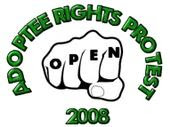 PHILADELPHIA INQUIRER
PHILADELPHIA INQUIRERMarch 14, 2008
N.J. bill would open birth records to adoptees
By Adrienne Lu
Inquirer Trenton Bureau
Like many adoptees, Heather Mulford goes through life with questions she may never get answered.
She wonders why her blond hair started turning gray when she turned 18. She worries about passing hidden genetic problems on to her three young children. And she would like to know which country or countries she could trace her roots to.
But unlike some adoptees, Mulford - a 38-year-old high school social studies teacher from Chester Springs - says she spends very little time pondering such questions.
"I'm not a huge believer in genetics," says Mulford. "Being a mom is getting up in the middle of the night and dealing with the fevers and kissing the scraped knees and rushing to the hospital to get stitches."
"Giving birth," she adds emphatically, "is just biological."
Even so, a TV program broadcast recently about another state giving adult adoptees access to their birth records caught Mulford's attention enough to send her to the Internet to look up information about a similar bill pending in New Jersey.
If signed into law, that bill would allow adult adoptees from New Jersey, such as Mulford, access to their original birth certificates, including their birth mothers' names - assuming the birth mother does not notify the state otherwise within a set period. The bill has cleared the Senate and is headed to the Assembly.
The issue is a sensitive one, given the delicate balance between an adult adoptee's right to know more about his or her origins and a birth parent's right to privacy.
In some cases, birth parents were promised by adoption agencies that the records would be sealed forever. According to the nonprofit Evan B. Donaldson Adoption Institute, the courts have typically found that such promises contradicted state law and are not legally binding. But no matter what the law says, some remain uncomfortable with the idea of the state breaking a promise made by someone else.
In New Jersey, some adoptees and advocate groups, including the New Jersey Coalition for Adoption Reform and Education, have been fighting for years to give adult adoptees access to information about their births and adoptions.
Few with firsthand experience on the other side of the issue are willing to speak out, however, because in many cases to do so would mean revealing secrets they had hoped to keep hidden for life.
Search for information
David Brodzinsky, a clinical and developmental psychologist who taught at Rutgers University for 32 years and now lives in California, said all human beings search for themselves, at some level. An adoptee's search for information about birth families, he said, is simply an extension of that search.
In addition, adoptees can feel emotionally undermined by the lack of control created when a state bars them from information on their own backgrounds, he said.
Mulford, who was adopted from New Jersey, says her parents never made her adoption - or those of her brother and sister - an issue.
Their parents answered questions about their adoptions much like any other parent would answer questions about their children's births, she says. In Mulford's case, the adoption story included an account of a ride home on a corporate jet when she was just three days old, an account that made her, as a child, feel important and wanted.
No grudges
Mulford holds no grudges against her birth mother, she says. Instead, she's grateful that woman made the decision she did so that Mulford could grow up in a loving family.
"If anything, I've felt overloved, because if you think about it, adoptees are wanted," she says. "The parents go out of their way to have their child."
Still, Mulford says, becoming a mother herself prompted her to start thinking about how nice it would be to be able to answer some of the questions at doctors' offices - whether this or that disease or condition runs in her family, for example.
Even so, Mulford says she would never demand to learn her birth mother's name if she would rather not be known.
Such mixed feelings are not uncommon among adoptees, Brodzinsky said.
"It's natural to have some degree of ambivalence," he said. "It may be about many things. You may be curious but anxious about what you'll find out or how you'll be received. We're always anxious about the unknown."
In his experience counseling adoptees, Brodzinsky said, most who do undertake a search are glad they did, even when it doesn't go as well as they had hoped.
"Most people are glad that they searched because it has helped them to answer questions," he said.
Some adoptees develop a compulsion to find their birth families.
Mulford, though, is not one of those people. She is not sure she would want to meet her birth mother, if given the option, although she would like to reassure her that she made the right decision.
Mulford imagines her birth mother was an unwed teenage girl who might appreciate knowing that the baby she gave up is now a mother and a teacher, a productive member of society.
She also worries that she could hurt her parents' feelings by seeking out her birth mother. She takes offense when some people refer to them as her "adoptive" parents. To her, she says, they are simply her parents - no qualifier necessary.
Mulford says she doesn't understand the adoptees who talk endlessly about the emptiness they feel inside because they were adopted.
"Live for what you have," she says. "If you spend your life feeling a void, how about appreciating what you have?"
"I guess," she concludes, "that's the way my parents raised me."
Link to article








No comments:
Post a Comment